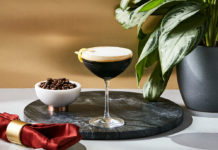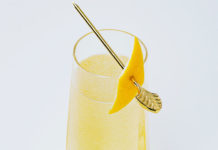Brush up on your mythology and your mixology with the new book Nectar of the Gods.
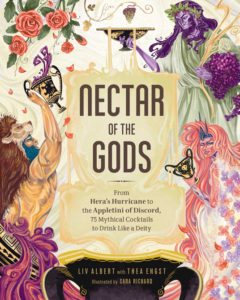 This cocktail book from S&S/Adams Media, which will be released on April 12, is from Liv Albert, host of the ultra-popular Let’s Talk About Myths, Baby! podcast. The book features recipes inspired by the stories of Greek history and mythology. Each recipe is presented alongside a story or character profile to introduce the reader to world of Greek mythology. Captivating illustrations from award-winning artist Sara Richard and expert mixology from beverage consultant Thea Engst round out the offering.
This cocktail book from S&S/Adams Media, which will be released on April 12, is from Liv Albert, host of the ultra-popular Let’s Talk About Myths, Baby! podcast. The book features recipes inspired by the stories of Greek history and mythology. Each recipe is presented alongside a story or character profile to introduce the reader to world of Greek mythology. Captivating illustrations from award-winning artist Sara Richard and expert mixology from beverage consultant Thea Engst round out the offering.
We’ve highlighted some of our favorite recipes from Nectar of the Gods, below. Consider adding some of these legendary cocktail recipes to your bar menu, and invite your guests to raise a glass to their inner god or goddess!
The River Styx
The River Styx is one of the most famous rivers of Greek mythology, famed for running through the Underworld to be crossed only with the help of the ferry-man. In truth that ferryman, Charon, typically helped the dead cross over the river Acheron, but Styx too played a large part in Underworld geography. Styx was the Titan nymph goddess of hatred while also the river itself (very cool). Styx was the eldest of the Oceanids, children of Oceanus and Tethys and some of the earliest deities to exist. Styx was mother of four personification gods: Nike (victory), Zelos (rivalry), Bia (force), and Kratos (strength). These five gods sided with Zeus in the Titanomachy and so avoided the punishment given to many of the rest of the Titans.
The River Styx is just what you’d expect: strong, bitter, and dark as the Underworld itself. Unfortunately, it will not make you a worthy opponent in a war with the Titan gods.
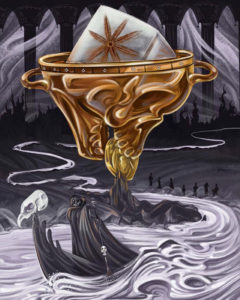
Ingredients:
1 star anise
1 ounce Cynar
1 ounce rye
1 ounce Combier kümmel
Directions:
- First, prepare a king cube worthy of the river of the dead: Fill half the cube and allow to freeze about 2 hours, then add the star anise. Fill the remainder of the tray and allow this to freeze fully. Once it’s frozen, add the cube to your kylix (a rocks glass).
- Combine the bitterness of Cynar, the strength of the rye, and the herbal, chthonic kümmel to a krater (a mixing glass) full of ice. Stir like Charon’s oar cutting through the rivers. Strain over the king cube and enjoy in the land of the living while contemplating the afterlife.
Pandora’s Jar
Pandora had a jar. It wasn’t a box until a millennium or so later, when someone translated the word pithos (an enormous storage jar) into variations on the word box. Myths of Pandora describe a woman who was used as a pawn to punish humanity. Humans had received fire and Zeus was mad, and Pandora was the unfortunate vehicle of his ire. She was one of the earliest examples of kalon kakon, a beautiful evil (or more fairly translated as “beautiful ugly”)—she was a trap, a so-called gift ensured to cause only harm: the release of the world’s evil. The concept of a curious woman full of agency who ignores the advice of men and opens a box releasing all the world’s evils isn’t found in the ancient sources (it screams biblical interference!). In truth, Pandora was just a woman created as a means of punishment. The jar of evils was always going to break or have its stopper knocked off. The evils were always going to be released; it didn’t matter what Pandora did or didn’t do.
Pandora’s Jar pays homage to this story of Pandora, whose jar of evils was never about curiosity or decision-making at all. Just don’t store Pandora’s Jar in a pithos—those things topple so easily, you’re sure to lose it all.
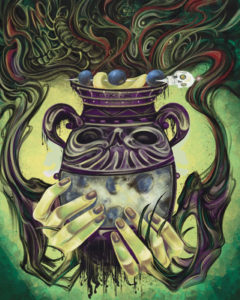
Ingredients:
1⁄2 cup blueberries
4 ounces soda water
1 1⁄2 ounces Empress gin
1 ounce Simple Syrup
1⁄2 ounce lemon juice
1⁄2 ounce crème de violette
1 fresh lemon wheel
Directions:
1. Add all but three of the blueberries to a psykter (a shaker) and muddle like the gods who formed Pandora from clay. Add the remaining ingredients aside from lemon wheel and three blueberries and ice. Shake while you consider the implications of blaming her “curiosity,” pour into a more reasonably sized jar than Pandora’s pithos (an amphora or Mason jar will do).
2. Add ice, then top with soda water. Garnish with a skewer of blueberry followed by the lemon wheel through the pith, a second blueberry enclosed by the other half of the lemon, and the final blueberry.
The Queen of Carthage
Dido was a Phoenician refugee who founded the city of Carthage in northern Africa (modern Tunisia). While Dido herself was probably mythical, Carthage was a very real place and a major enemy of the Roman Republic. Dido left Phoenicia when her brother, Pygmalion, had her husband killed. Other than her major (if tragic) role in Virgil’s Aeneid, Dido is a bit of a mystery, showing up in fragments and bits of myths that have survived. Still, what little is known about her makes for a fascinating woman. Mythologically, Dido left her homeland, founded a Phoenician colony, Carthage, and served very successfully as its queen (without a king!) for a long time. Historically, Carthage became a major player in the Mediterranean before being completely wiped out by the Romans. Dido’s story was co-opted by Virgil in the Aeneid and turned her into a woman who was so in love with Aeneas that when he abandoned her she threw herself on a funeral pyre.
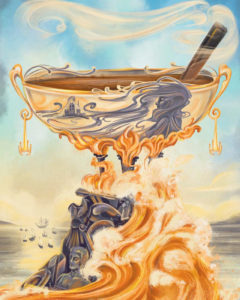
Remember Dido not for her role in the Aeneid but as an incredible, strong, and powerful founding queen of Carthage, a groundbreaking queen in a sea of kings. Toast the queen of Carthage with this earthy and fiery cocktail named in her honor.
Ingredients:
1 ounce overproof rum
1 cinnamon stick
2 ounces Hirsch Horizon Bourbon
3⁄4 ounce ouzo
1⁄2 ounce Cinnamon Syrup
Directions:
1. Begin by pouring the rum into a small bowl or glass; allow one end of the cinnamon stick to soak in it.
2. While that’s soaking, combine the rest of the ingredients in a krater (a mixing glass) with ice. Stir while you consider just how not worth it Aeneas was, then strain into a stemmed kylix (a coupe glass) fit for royalty. Place the dry end of the cinnamon stick in the cocktail before you light the rum-soaked end on fire. Extinguish immediately so that there is a nice aroma and slight smoke from the stick. Sip as you survey your Carthaginian kingdom.


